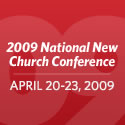
Top Ten Theological Issues for the Church in the Next Ten Years
Orginally published on Tuesday, April 10, 2007 at 7:10 AM
by Todd Rhoades
Brian Schulenberg has a post at his blog where he tackles what he thinks will be the top ten theological issues the church will face in the next 10-20 years. I'll list them here (and you can find out more by going over to Brian's blog). Take a look and let me know which you think will be the 'biggies'. Are there some on the list that you think shouldn't be? And what would you ADD to the list?
1) Soteriology - I am so concerned as I read more and more people who would self identify as Christians who are saying that Jesus is not the only way to salvation.
2) The Embrace of Open Theism - So many of the college students and young adults that I work with have bought into this doctrine, which among other things, teaches that God does not know the future.
3) Homosexuality - How does the church respond to the homosexual community?
4) Ecclesiology - House church? Emerging church? Traditional? Contemporary? Multi-ethnic? Homogeneous? Seeker sensitive? Seeker driven? Gather for edification, scatter for evangelism? Mega-church, bad? Mega-church, good?
5) The Bible - Absolute truth? Inerrant? Infallible?
6) Social Justice, Global Warming, etc. - Creation care has caused quite a stir in recent months. Younger Evangelicals are passionate about social justice. Jesus was passionate about social justice. What would Jesus do?
7) Red Letter Christians - Are Jesus’ words the most important in all of Scripture?
8) Infighting in the Church - Satan is having a heyday here. When does God want us to go to the mat with other Christians? Emerging church vs. Traditional Church? Prayer styles? Worship styles? Theological issues? Urban vs. Suburban?
9) Jesus Junk - The consumerization of the American church.
10) Friend or Foe? - Is the Gospel a friend to culture or a foe to culture?
Read more at Brian’s Blog: Pass the Salt...
FOR DISCUSSION: What would you add or subtract from this list?
![]()
This post has been viewed 3793 times so far.
There are 15 Comments:

Hi... I'm Todd Rhoades. I'm a Christ-follower, husband, father and I love to connect leaders with other leaders. Hopefully you'll find something here at MMI you like and will return often. If you want, you can find out more about me or follow my every step on Twitter.
![]()







-
Posted by
Tuesday, April 10, 2007 at 7:23 AM
-
Posted by
Tuesday, April 10, 2007 at 7:44 AM
-
Posted by
Tuesday, April 10, 2007 at 9:43 AM
-
Posted by Andy McAdams
Wednesday, April 11, 2007 at 5:46 AM
-
Posted by
Wednesday, April 11, 2007 at 12:29 PM
-
Posted by
Wednesday, April 11, 2007 at 1:46 PM
-
Posted by Toby Logsdon
Monday, December 22, 2008 at 7:57 AM
-
Posted by
Monday, December 22, 2008 at 9:53 AM
-
Posted by Tony Myles
Monday, December 22, 2008 at 10:34 AM
-
Posted by
Monday, December 22, 2008 at 10:46 AM
-
Posted by Jerry D. Hill
Monday, December 22, 2008 at 10:55 AM
-
Posted by
Monday, December 22, 2008 at 11:49 AM
-
Posted by Greg Brandenburg
Monday, December 22, 2008 at 11:53 AM
-
Posted by
Monday, December 22, 2008 at 4:34 PM
-
Posted by
Tuesday, December 23, 2008 at 4:22 PM
Post Your Comments:Many of these have been with us for a long long time and will be with us for a long long time. I have great concerns about numbers 1, 4 and 6 especially. I think no. 2 will go away quietly. The only way it makes sense for God to not know the future is to think about eternity with our temporal nature as a starting point. That is RIDICULOUS. God is in the past present and future all together and our little time-based brains can’t understand that anyway.
Good list.
Good list. Not in the order I necessarily would list them. I don’t come here to debate theological
positions..... so I’ll refrain from changing the list by either adding, subtracting, or renumbering. As to the biggies.... I’ll refrain here as well.
Good list though.
Sounds like the same old stuff to me.
I agree with Peter. Some of these issues have been with us for decades and more.
#1 Was brought to the forefront during the so-called “rise of liberal theology” right around the “God is dead era.” But all you have to do is look at the mainline churches and see where that way of thinking has gotten them. They are losing thousands of church members each year.
#2 How anyone could believe this and honestly call themselves “believers” is beyond me. If God doesn’t know the future...then how could be possibly be God. I’m amazed at people that think that they are smarter then “The Almighty” and take one of His attributes away is plain stupid.
#3 The church as a whole will probably respond to this issue the same way it has for the past 20 years or so, by putting its head in the sand and home it goes away. It won’t.
#5 Why bother reading the Bible if it’s not “God breathed?” If I can’t rely on ALL OF IT then I can’t rely on any of it. By the way, there is a reason we call the Bible, “THE WORD OF GOD!” This issue is more them 100 years old make popular by liberals, but all you have to do is see the thousands of people flock to the churches that proclaim God’s Word as the final authority and compare that with declining denominations.
#6 I’m concerned about this but not to the extent that I’m going to put a whole lot of time into it. I understand that younger people are occupied with this, because that’s been a major theme in the school systems. However, the more time we put into this earth, the less time that Christians will put into preparing people for the next world coming. Don’t lose focus...we are called to “make disciples” first and foremost.
#7 Once you settle #5 this one falls into place. “ALL SCTIPTURE IS INSIPRED OF GOD”, Paul says.
#8 Now there’s something new. NOT!!!!!! Just read the book of Acts and see that even the early church had problems getting along. I will admit it’s extremely serious today, which is one of the reasons I do what I do.
#10 Paul tells us that, “The preaching of the cross is foolishness, to those that perish.” So, it will most often be foe. Always has been and always will be, until Jesus comes. But, we as those responsible for giving out the message can make it friendlier by our approach to a dying world.
I’m a little puzzled by the argument over #1. I was taught that Jesus Christ is our savior and no one gets to heaven but thru Him.
Earlier in the week, Tony Campolo was criticized for 2 comments he made:
“I am saying that there is no salvation apart from Jesus; that’s my evangelical mindset. However, I am not convinced that Jesus only lives in Christians”
and “Jesus is the only Savior, but not everybody who is being saved by Him is aware that He is the one who is doing the saving”
I see Tony saying that Jesus is the only savior and there is no salvation but thru Him. Others seem to focus only on Tony’s idea that Jesus may work (live) in the lives of non-Christians, in addition to touching the lives of Christians. Is it not possible that Jesus touches the lives of non-Christians? Is it not possible that Jesus touches the lives of people who have not yet given their lives over to Him but will one day?
Is it a prerequisite that a person acknowledges Jesus as their savior and is baptized before Jesus can work in their lives? I see one aspect of the omnipotence of God being that He can work in the lives of anyone He chooses to, Christian or not. In recent years the Nobel Peace Prize has been awarded to numerous individuals who are not Christians. Is it beyond the realm of belief that Jesus was at work in the lives and work of these non-Christians?
I agree that Jesus is the only way to salvation, but it seems to me that many today read more into this that it means; like the idea that Jesus ignores and forsakes anyone and anything not Christian.
I grew up and lived much of my life in multi-cultural, multi-faith environments and am resigned to the fact that I will not be able to convert everyone I meet to Christianity, but I try to engage people of other faiths in a conversation anyway.
As for the list, there are indeed many issues the church still needs to work thru. As long as we (Christians) are arguing and berating each other we are not presenting a Christ-like image to the world.
There’s one big issue missing from the list, in my opinion, and that is Christology, especially with all of the literature of both the Da Vinci Code sensationalized fiction variety, as well as the growing apologetic for a gnostic viewpoint that would deny Jesus’ full divinity and/or humanity.
I think this list pretty much hits the nail on the head. There is an underlying problem behind many of these struggles, however: the denial of the historical-grammatical method of Biblical interpretation. How does one arrive at the conclusion that there is salvation without faith in Christ? Custom-design theology (e.g., “I’ll take a double dose of God’s grace, but minimize His wrath"). Same with open theism, emergent church, homosexuality, etc.
It comes as no surprise that our churches will stumble around in the dark on these issues until we return to teaching solid, fundamental interpretation to our congregants.
Let me make a clarification on #2. First, let me say I totally disagree with open theism and, am myself, reformed in my theology. Having said that, I can tell you it’s not an issue that will quietly go away and that just because someone believes this, doesn’t make them a non-Christian. I know this because we have a decent sized group of believers in our church that tend towards this doctrine and nobody questions their love for Jesus.
They would also be the first to tell you that the description given in #2 doesn’t accurately portray them. They would say that their view of God is unchanged and still believe that he is totally omniscient. In fact, they would argue it doesn’t have to do with what God can or can’t do. Open Theism, in this view, is not about God but more about the nature of future reality. So, a sovreign God still knows the future but it’s an open future where he knows every possible outcome of every possible choice to the smallest degree. This is the only way that a true freedom of choice would be preserved and would allow for a God to have a true relationship with his believers.
Again, I want to stress I think there are some really dangerous ideas associated with this theology. But, I did want their views to be portrayed accurately as well as to say that despite the bad theology, these folks are quite genuine in their faith.
We should also add to the list, “Pastors who preach against addictions while drinking massive amounts of coffee themselves.”
Actually, for some reason that would never make the list, would it?
It’s important to realize where potential points of error and division lie. But simplistic responses (like Andy above, for example—no offense meant, but as an example) are not the kind of thing that typically resolve error or heal division. The church is facing a time when we need thoughtful articulation on these issues, but conservative Christians mus learn the beauty and strength of the Meldenius’ axiom;
In ESSENTIALS Unity
In NON ESSENTIALS Liberty
in ALL THINGS Love
This will force us to recognize that as important as some of these issues are (e.g. 2, 3, 4, etc.) they are not in fact essential to our faith, and therefore must be areas where we allow a range of freedom in Christ without so quickly drawing our lines of division. It puzzles me why Christ followers are so unnecessarily divide themselves, when our enemy gloats. Until we can find common ground in those with views different from ours on non essential issues, we will remain weak and ineffective. We must come togehter around item #1—like the first disciples did, liek the church in Acts did, like the church described in Revelation does. Thanks for your help in pulling us together over the One who draws all people to himself, Todd, rather than pushing us further apart over matters that though they be very important, are matters of discussiona and study, but not the primary question given us on judgment day. It doesn’t mean it doesnt’ matter what we say about them now...it does mean it matters how we treat others who also serve Christ alone but who disagree with us on non essentials. I meet too few Christians who seem to get it. It’s too easy to simply say, “If you agree with me, you’re in.” Not smart, not helpful, and not accurate.
Is Jesus the Word of God?
What is the work of the Holy Spirit?
Were the gifts made to the Church for any lasting purpose. Did they disappear when we learned to read.(use our minds to understand God)
Is God a spirit?
Are we made in the image and likeness of God?
If so, explain.
Thanks for thinking with me. Jerry Hill
you hit the nail on the head. most of us deal with the majority of these issues from week to week. each week I look forward to receiving your blog. it is refreshing and encouraging to have something specifically written for pastors. information like this is few and far between. nice work & keep the faith.
I would add Ecclesiology. Not because unbelievers aren’t coming to church but because believers are staying away and supporting para-church institutions first .
I’m an evangelical pentecostal pastor of a church in a mainstream denomination in the UK and I also hold that the future is open. You would call me an open theist, though I would say that it is not my theism that is open, but my view of the future. Specifically I would argue that time itself does not actually exist, and that God is so great he can make a universe that is genuinely indeterminate.
I have found this view, whilst not perfect, answers almost all of the questions and issues I had in the arena it relates to. Frankly it was like a breath of fresh air and I hold this view and have found that it strengthened my faith & trust in God in a way that has been incredibly profound. The outworkings of the doctrine & its effect on other doctrines bring real freedom.
I cannot however reveal this openly as presently I am sure that my denomination would call it heresy, much like most people reading this would think so too. All I can say is that this has had a profoundly positive effect on my personal walk with God and in my vocation as a Pastor. However, my commitment to truth, and finding the truth, is more important than my commitment to an institution - I’m just very careful with whom I share this. But it is very important to me, to be intellectually consistent in my faith - something the other views of the future fail to do.
Have you wondered why there is so much take up of Open Theism? Is it tapping into something that classic theism is failing to address satisfactorily?
I am grateful to Tony Campolo for articulating what many of us have come to believe as truth: That salvation only comes through Jesus Christ (God in the flesh), but that God works and invites all people everywhere to come to faith through Christ. Certainly God worked in Saul’s life and saw the possibilities of what he could/would accomplish for Christ! None of us can say when or how God works and how God uses whom God chooses to accomplish his purpose. I would much rather err on the side of love, than shut out anyone God pursues! Only God knows our “condition.” If only “Christians” would behave like Christ! THen we might see more who would desire to be Christian, too!
Page 1 of 1 pages